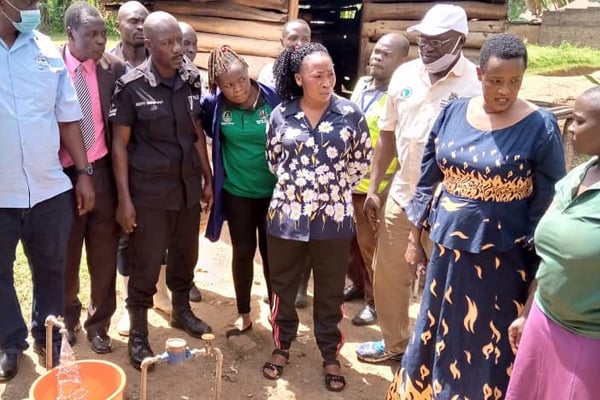Bad weather forces Bududa locals to embrace irrigation

State minister for Water Aisha Sekindi (second right ) with the beneficiaries of the gravity flow scheme in Bududa District last Friday. PHOTO/FRED WAMBEDE
What you need to know:
- “The charged cost of Shs2,500 for a unit is the standard cost set by the ministry,” Ms Sekindi said, adding that the money is for maintenance of the scheme,” Irene Aisha Sekindi, State minister for Water
As climate change upends farming traditions, locals in the hilly sub-counties of Bududa District have resorted to crop irrigation in bid to sustain their livelihoods.
Mr Philip Nakhaboya, a resident of the remote village of Nyende in Bunatsami Sub-county, told Daily Monitor on Tuesday that irregular rain partners have left them with no option but to irrigate their crops using local sprayers.
“Irrigating crops is the only way for us to make subsistence farming feasible, short of that, we will face hunger,” Mr Nakhaboya said.
Ms Aidah Nabulo, a resident of Busambu Village in Nabweya Sub-county, said availability of gravity flow water has enabled them to grow crops and sustain their livestock despite the unpredictable rains.
“The water-related constraints were the root cause of poor livelihoods but since the government extended water, we are utilising it. For instance, I sell a jar of water at Shs100,” she said.
Bududa-Nabweya Gravity Flow Scheme provides clean safe water for both domestic and commercial use for communities living in the mountainous sub-counties.
Built at a cost of Shs23 billion, the scheme serves sub-counties of Nabweya, Bushiribo, Bunatsami, Bulucheke and Bukigai, and Bududa Town Council, and some villages in the neighbouring districts. Mr John Matenyo, a resident of Shisali Village in Bunatsami Sub-county, said for a long time, they had faced a challenge of water shortage.
“Our women and children used to trek long distances, downhill to fetch water for drinking. And now it would have been worse with the effects of climate change,” he said.
The gravity flow scheme has a water capacity of 4,488.7 m3/day and is composed of 11.38km gravity transmission lines. The water for the scheme is transmitted by gravity from River Wanangonyi .
Although the scheme has improved agriculture productivity, the leaders say the dues being charged to access water are too high. Mr Micheal Bukoma, the councillor representing Nabweya Sub-county, said the water supply is also very inadequate.
“We need more water tanks in various areas so that water supply is adequate to support our activities,” Mr Bukoma said.
The State minister for Water, Ms Aisha Sekindi, while inspecting the scheme last week, acknowledged that connections are still low in the hilly sub-counties.
“We will improve on water supply because connections are still low though there is water flow and it’s helping locals,” she said.
Ms Sekindi revealed that the government will soon have more households connected to water.
She urged the beneficiaries to pay for water, saying there is no free water in the country. “The charged cost of Shs2,500 for a unit is the standard cost set by the ministry,” Ms Sekindi said, adding that the money is for maintenance of the scheme.
Mr Stanley Watenga, the principal engineer in the Ministry of Water and Environment, said the water is enough to serve all households in the beneficiary sub-counties.



